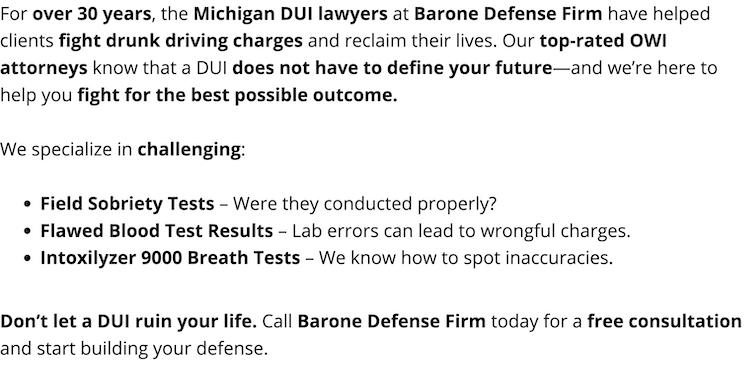DUI Stops
DUI Stops: What You Need to Know About Traffic Stops in Michigan
When defending a DUI case, one of the first elements scrutinized is the initial traffic stop that led to the arrest. An experienced Michigan DUI attorney will explore every angle, from questioning the legality of the stop to examining the administration of field sobriety and chemical BAC tests. The prosecution must prove each element of the case beyond a reasonable doubt, and a skilled defense lawyer can expose weaknesses in their argument.
What Makes a Traffic Stop Lawful in Michigan?
Law enforcement officers cannot arbitrarily pull you over. For a traffic stop to be lawful, the officer must have reasonable suspicion or probable cause to justify the stop. Common reasons include:
- Observing a traffic violation, such as running a red light or speeding.
- Noticing erratic driving behavior, like swerving or abrupt braking.
- Suspecting vehicle defects, such as a broken taillight or expired registration.
Additionally, officers may wear body cameras to document interactions, conduct preliminary breath tests, or administer field sobriety tests to gather evidence for an arrest. A "hunch" or vague suspicion is not enough to justify a stop under Michigan law.
Challenging the Traffic Stop in Court
During trial, your DUI defense attorney will cross-examine the arresting officer to determine whether the traffic stop was lawful. Cross-examination is a powerful tool to uncover inconsistencies and raise doubt.
For example:
- Swerving Justification: If the officer claims the stop was due to swerving, your attorney may ask whether other drivers were also swerving and, if so, whether they were stopped. Demonstrating selective enforcement can weaken the prosecution's argument.
- Body Camera Footage: Reviewing body camera footage can reveal discrepancies between the officer's testimony and what actually occurred during the stop.
By attacking the traffic stop, your attorney can raise questions about the legitimacy of the arrest, potentially leading to reduced charges or even case dismissal.
DUI Roadblocks and Their Legality in Michigan
Unlike some states, Michigan does not permit DUI roadblocks. These types of random stops have been deemed unconstitutional under Michigan law. Police must have a legitimate reason to pull a vehicle over, ensuring drivers are not stopped arbitrarily.
Alternative Police StrategiesWhile roadblocks are prohibited, Michigan law enforcement agencies employ other strategies to identify potential violations, such as:
- Seatbelt Checkpoints: During campaigns like "Click It or Ticket," officers observe passing vehicles for seatbelt violations. If a violation is spotted, the officer radios nearby patrol cars to initiate a lawful traffic stop.
- Vehicle Defect Observations: Officers often look for obvious vehicle defects, such as broken headlights, which can provide grounds for a stop.
- Holiday Crackdowns: Increased patrols during holidays focus on identifying and stopping impaired drivers.
The Role of an Experienced DUI Attorney
Defending against a DUI charge requires a strategic and thorough approach. An experienced attorney will:
- Challenge the legality of the initial traffic stop.
- Investigate procedural errors in the administration of sobriety or BAC tests.
- Cross-examine officers to expose inconsistencies in their testimony.
- Review body camera or dashcam footage for evidence of misconduct or procedural violations.
Why Choose Barone Defense Firm?
With decades of experience in DUI defense, the Barone Defense Firm is a trusted advocate for
Michigan drivers facing OWI charges. Our attorneys:
- Protect Your Rights: We challenge unlawful stops and procedural errors to ensure your case is handled fairly.
- Deliver Proven Results: We’ve successfully defended thousands of DUI cases across Michigan.
- Provide Statewide Representation: From Bloomfield Hills to Ann Arbor, Troy, Grand Rapids, and beyond, we’re here to help.
Take Action Today to Protect Your Future
If you’ve been stopped for a suspected DUI in Michigan, don’t wait to seek legal representation. The Barone Defense Firm is here to defend your rights, challenge unlawful stops, and minimize the consequences of an OWI charge.
Call us at 248-306-9158 or contact us online for a free consultation. Our experienced attorneys are ready to fight for you.
 Barone Defense Firm Home
Barone Defense Firm Home
















